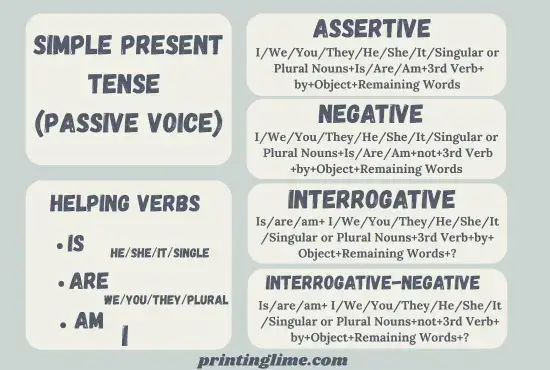Simple Present Tense(Passive Voice), also known as Present Indefinite Tense(Passive Voice) is used to present the sentences of habitual actions of the present time, in which action is more emphasized than the doer. It means that in passive voice form he subject of the sentence receives the action instead of doing it.
General Rules of Simple Present Tense(Passive Voice)
To convert the Active Voice Sentences of Simple Present Tense or Present Indefinite Tense into Passive Voice form, follow the following general rules.
- First, convert the object of Active Voice sentence into the subject of Passive Voice Tense.
- Then, use the helping verbs “is/are/am” according to the Suject of Passive Voice Tense.
- After this, use 3rd form of Verb in order to show the passive nature of the action.
- Then, use the preposition “by” to show the actual doer of the present habitual action.
- After this, change the Subject into the Object of the Passive Voice Sentences.
Helping Verbs of Simple Present Tense(Passive Voice)
Passive Voice Sentences of Simple Present Tense use 3 different types of helping verbs depending on the singular and plural Noun or pronoun.
“Is” as Helping Verb in Simple Present Tense(Passive Voice)
“Is” is used as a helping verb in the Passive Voice Sentences of Simple Present Tense with singular nouns and pronouns (He/She/It). These sentences with “is” as a helping verb follow a specific formula.
He/She/It/Singular Noun+ is+ 3rd Verb+ by + Object+ Remaining Words
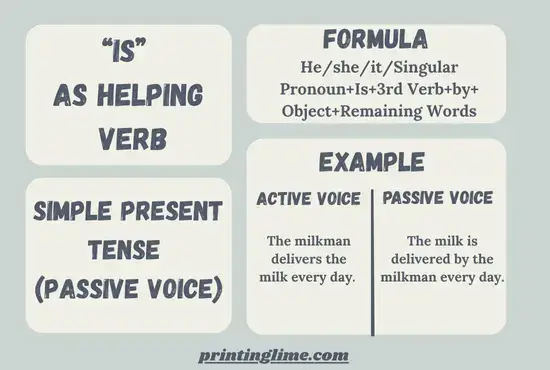
Examples of “Is” as Helping Verb in Simple Present Tense(Passive Voice)
The following are some examples of Passive Voice Sentences of Simple Present Tense that have “is” as a helping verb.
- Sarah writes the letter.
- The letter is written by Sarah.
- He bakes the cake every morning.
- The cake is baked by him every morning.
- They clean the room daily.
- The room is cleaned by them daily.
- The manager uses the phone.
- The phone is used by the manager.
- The teacher checks the homework.
- The homework is checked by the teacher.
- Many students read the book.
- The book is read by many students.
- We speak English in the classroom
- English is spoken by us in the classroom.
- I prepare the report on time.
- The report is prepared on time.
- The milkman delivers the milk every day.
- The milk is delivered by the milkman every day.
- She buys the newspaper every morning, early.
- The newspaper is brought by her every morning, early.
“Are” as Helping Verb in Simple Present Tense(Passive Voice)
“Are” is used as a helping verb in Simple Present Tense(Passive Voice) sentences with plural nouns and pronouns. Thus, Passive Voice Sentences of Simple Present Tense with “are” has the following formula.
We/You/They/Plural nouns+ are+ 3rd Verb+ by Object+ Remaining Words
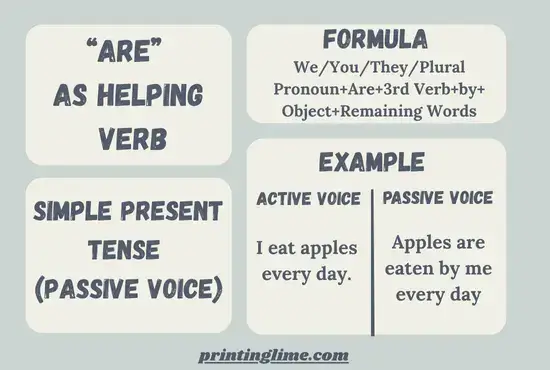
Examples of “Are” as Helping Verb in Simple Present Tense(Passive Voice)
The following are some examples of the Simple Present Tense(Passive Voice) sentences, that have “are” as helping verb.
- I eat apples every day.
- Apples are eaten by me every day.
- The postman delivers the letters in the morning.
- The letters are delivered by the postman in the morning.
- The students read the books in the library.
- Books are read by the students in the library.
- He asks questions in every class.
- Questions are asked by him in every class.
- She cleans the floors daily.
- The floors are cleaned by her daily.
- We repair the cars in this garage.
- We repair cars in this garage.
- They serve meals at 8 PM daily.
- Meals are served by them at 8 PM daily.
- He sends messages via email.
- Messages are sent by him via email.
- The teacher corrects their mistakes.
- Their mistakes are corrected by the teacher.
- We play games on weekends.
- Games are played by us on weekends.
“Am” as Helping Verb in Simple Present Tense(Passive Voice)
“Am” is used as a helping verb with only “I”. So, Passive Voice Sentences of Simple Present Tense with “I” as Subject, have the following formula.
I+ am+ 3rd Verb +by + Object+ Remaining Words
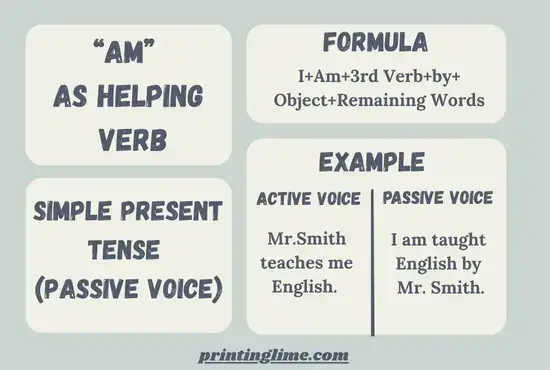
Examples of “Am” as Helping Verb in Simple Present Tense(Passive Voice)
Following are some examples of Simple Present Tense(Passive Voice) sentences that have “am” as helping verb.
- They invite me to the party.
- I am invited to the party by them.
- The teacher gives me homework every day.
- I am given homework every day.
- My parents tell me to be careful.
- I am told by my parents to be careful.
- My teacher praises me.
- I am praised by my teacher.
- Mr.Smith teaches me English.
- I am taught English by Mr. Smith.
- English is taught to me by Mr. Smith.
- You offer me help regularly.
- I am offered help regularly.
- My friend calls me every morning.
- I am called by my friend every morning.
- They send emails to me daily.
- I am sent emails by them daily.
- Emails are sent to me by them daily.
- She asks many questions to me, every day.
- I am asked many questions by her every day.
- Many questions are asked to me by her, every day.
- He chooses me for the national team.
- I am chosen for the national team by them.
Formula for Sentences of Simple Present Tense(Passive Voice)
Assertive, Negative, Interrogative, and Interrogative-Negative Sentences of Simple Present Tense take “is/are/am” as helping verb with 3rd Verb to represent the passive habitual actions of the present time.
Formula for Assertive Sentences of Simple Present Tense(Passive Voice)
The passive form of Assertive Sentences of Simple Present Tense is used to indicate the positive actions of the present time that have been exercised regularly, and now have become a habit. These sentences have the following general formula.
I/We/You/They/He/She/It/Nouns+ is/are/am+ 3rd Verb+ by+ Object+ Remaining Words
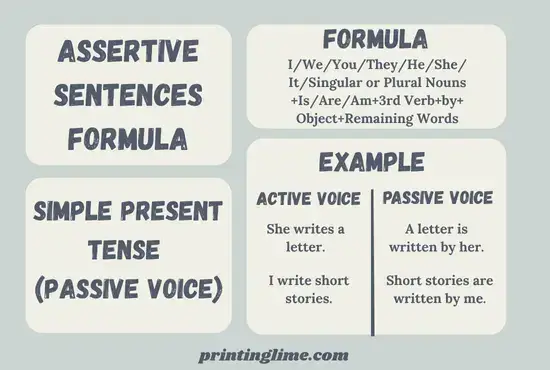
Examples of Assertive Sentences of Simple Present Tense(Passive Voice)
Following are some examples of Assertive Sentences of Simple Present Tense(Passive Voice).
- She writes a letter.
- A letter is written by her.
- They clean the room daily.
- The room is cleaned daily by them.
- He reads the newspaper every morning.
- The newspaper is read every morning by him.
- The teacher explains the lesson clearly.
- The lesson is explained clearly by the teacher.
- We watch movies on weekends.
- Movies are watched on weekends by us.
- He delivers the mail.
- The mail is delivered by him.
- The chef cooks delicious food.
- Delicious food is cooked by the chef.
- They play football in the evening.
- Football is played in the evening by them.
- She sings a beautiful song.
- A beautiful song is sung by her.
- I write short stories.
- Short stories are written by me.
Formula for Negative Sentences of Simple Present Tense(Passive Voice)
Negative sentences in the passive voice of the present indefinite tense are used to indicate negative passive actions that have been practiced regularly in the present time. These sentences have following general formula for sentences.
I/We/You/They/He/She/It/Noun+ is/are/am+ not+ 3rd Verb+ by+ Object+ Remaining Words
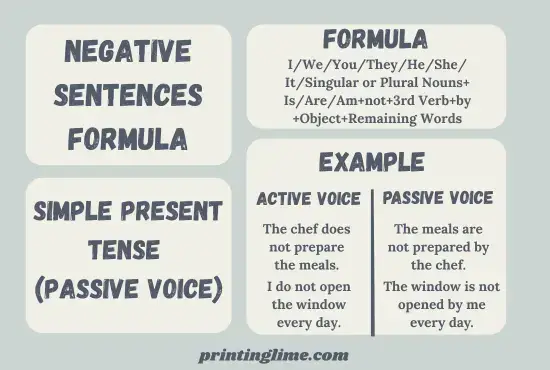
Examples of Negative Sentences of Simple Present Tense(Passive Voice)
Following are some examples of Negative Sentences of Simple Present Tense(Passive Voice).
- She does not clean the room.
- The room is not cleaned by her.
- They do not deliver the packages on time.
- The packages are not delivered on time by them.
- He does not write the reports.
- The reports are not written by him.
- The chef does not prepare the meals.
- The meals are not prepared by the chef.
- We do not watch horror movies.
- Horror movies are not watched by us.
- John does not paint the house.
- The house is not painted by John.
- The company does not sell cheap products.
- Cheap products are not sold by the company.
- I do not open the windows every day.
- The windows are not opened by me every day.
Formula for Interrogative Sentences of Simple Present Tense(Passive Voice)
Interrogative Sentences of Simple Present Tense(Passive Voice) is used to present the
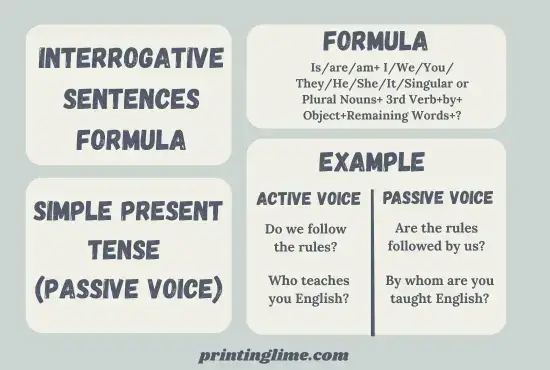
Examples of Interrogative Sentences of Simple Present Tense(Passive Voice)
Following are some examples of Interrogative Sentences of Simple Present Tense(Passive Voice).
Yes/No Questions
- Do you write letters?
- Are letters written by you?
- Do they repair the cars?
- Are the cars repaired by them?
- Do we follow the rules?
- Are the rules followed by us?
- Do the students complete the homework?
- Is the homework completed by the students?
- Do farmers grow wheat here?
- Is wheat grown here by farmers?
- Does he paint the walls?
- Are the walls painted by him?
- Does she wash the clothes?
- Are the clothes washed by her?
- Does the chef cook the food?
- Is the food cooked by the chef?
- Do the workers build the houses?
- Are the houses built by the workers?
- Does the mechanic fix the bike?
- Is the bike fixed by the mechanic?
Wh- Questions (What, When, Why, Who, Where, etc.)
- What do you eat every day?
- What is eaten by you every day?
- When do they open the shop?
- When is the shop opened by them?
- Why do you close the windows?
- Why are the windows closed by you?
- Where does she keep the documents?
- Where are the documents kept by her?
- Who teaches you English?
- By whom are you taught English?
- How do they manage the event?
- How is the event managed by them?
- What does the child draw?
- What is drawn by the child?
- Why does he carry heavy bags?
- Why are heavy bags carried by him?
- Who prepares the reports?
- By whom are the reports prepared?
- When does he complete the task?
- When is the task completed by him?
Formula for Interrogative-Negative Sentences of Simple Present Tense(Passive Voice)
Interrogative-Negative Sentences of Simple Present Tense(Passive Voice) are used to indicate that habitual
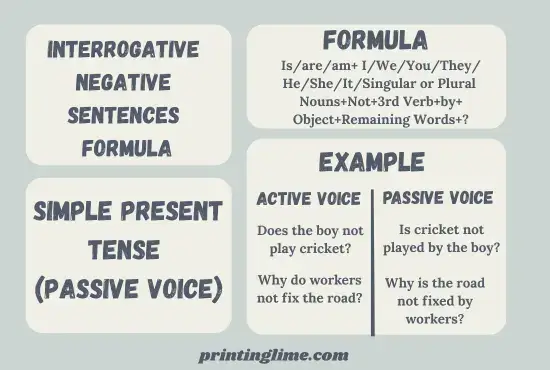
Examples of Interrogative-Negative Sentences of Simple Present Tense(Passive Voice)
The following are some examples of Interrogative-Negative Sentences of Simple Present Tense(Passive Voice).
Yes/No Questions
- . Do you not help the needy?
- Are the needy not helped by you?
- Do they not play football every Sunday?
- Is football not played every Sunday by them?
- Do we not celebrate Independence Day?
- Is Independence Day not celebrated by us?
- Do students not complete their assignments?
- Are the assignments not completed by students?
- Do children not watch cartoons?
- Are cartoons not watched by children?
- Does the boy not play cricket?
- Is cricket not played by the boy?
- Does she not write emails daily?
- Are emails not written daily by her?
- Does the cat not catch mice?
- Are mice not caught by the cat?
- Does the teacher not teach English?
- Is English not taught by the teacher?
- Does the manager not approve the files?
- Are the files not approved by the manager?
Wh- Questions (What/When/Where/Why/Which/Who)
The Interrogative-Negative Sentences of Present Indefinite Tense(Passive Voice),
- Why do you not attend the meeting?
- Why is the meeting not attended by you?
- When do they not clean the park?
- When is the park not cleaned by them?
- Where do people not celebrate this festival?
- Where is this festival not celebrated by people?
- Why does he not water the plants?
- Why are the plants not watered by him?
- Why does she not finish the homework?
- Why is the homework not finished by her?
- When does the chef not prepare the food?
- When is the food not prepared by the chef?
- Why do students not submit their work?
- Why is the work not submitted by students?
- Where does the company not deliver orders?
- Where are orders not delivered by the company?
- Why do workers not fix the road?
- Why is the road not fixed by workers?
- What do they not follow in the manual?
- What is not followed in the manual by them?

